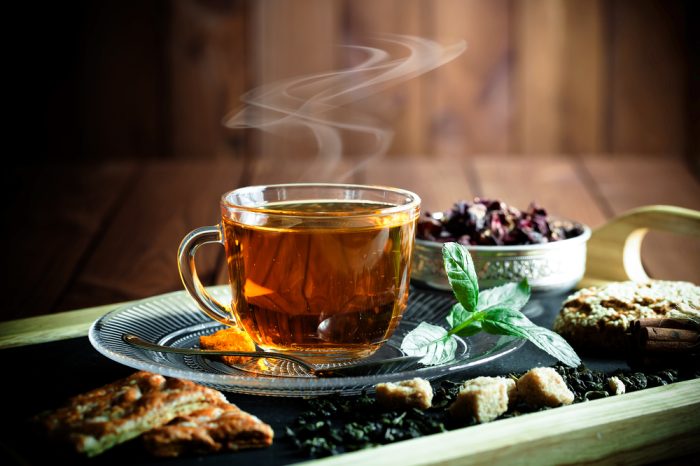
Would you like your water with or without wet leaves in it? It might sound like a strange question, but it’s one that millions of people worldwide ask themselves every day the moment they think about having tea to drink. Tea is a drink that dates back to ancient civilizations and is just as varied as each culture that has adopted it. There are so many different types of tea on the market today made in so many different ways that you could write a series of books solely on the drink and its history. However, this is not that book series.
At its most basic level, tea is just water that has had dried shrubbery soaked in it. This begs the question: is drinking tea the same as drinking water? After all, they’re both just water at the end of the day; wouldn’t that make sense? Sip your tea or drink water from our Atlanta bottled water delivery services now while we delve into these juicy tea and water facts.
Hydration in Brief
Before we truly explore the topic of tea vs. water, it’s important to remember how hydration works and what can end up affecting your hydration overall. Fluids are necessary for our body to function, and water especially plays a major part in digestion and waste removal. In fact, most of the water loss that your body experiences is very easy to see—urine and sweat are the two main culprits. This is why drinking too much of any drink at once can make you have to pee with a severe urgency later on. Any substance that increases urination frequency is called a diuretic, and it goes without saying that any drink containing these chemicals in vast quantities will dehydrate you faster.
Water, in its purest form, contains no such compounds. It should also go without saying that water is also the best form of hydration if you just don’t want to worry about whether or not it’s good for you. After all, it’s water. The only thing you need to consider when pouring a glass of water is the quality of the water itself. If it’s dirty, it can become a vector for disease, chemicals, and even insects. Going forward, we’ll assume that we’re comparing tea to a fresh, clean bottle of spring water. How does it stack up?
Tea’s Many Faces
Now that we have our groundwork established, it’s time for the big question: does tea count as water? If you picked up a glass of tea right now and slammed it down, would it hydrate you just as much? Also, even if it didn’t, would there be some miraculous health benefit that would make up for it tenfold? Or, worse, does tea dehydrate you? The answer is: what kind of tea?
As said before, tea can look very different depending on the culture it’s from. Though it’s considered to have first been consumed in China, the exact story behind the first glass of tea is unknown. It seems that each individual culture in and around China has its own spin on where, when, and who was there when it was discovered. One thing is consistent, though: “true” tea is made using the leaves of the plant camellia sinensis. In all forms, this leaf contains at least some small amount of caffeine—a known diuretic. So does that mean that tea is automatically worse than water? To answer that, we need to look at the individual types of tea and parse out their benefits, then weigh them against their caffeine content. A higher caffeine content will produce a stronger diuretic effect, so the blends that are higher in caffeine will invariably cause a more rapid rate of dehydration.
Black Teas
Black teas are the American standard. If you have ever ordered a glass of sweet tea at a restaurant—also a very American thing to do—it was likely brewed using black tea unless otherwise specified on the menu. They have a dark, coppery hue when brewed and a bolder, more intense flavor than other teas. Black tea is also often used in popular breakfast mixes such as English Breakfast, Irish Breakfast, and Earl Grey.
Unfortunately, black teas are high in caffeine, with around half the caffeine content of a cup of coffee—47 mg, give or take. Though this also automatically makes them more hydrating than a steaming cup of Joe, this also means that you will find yourself becoming dehydrated sooner after than if you had just pounded a tall glass of water. However, it does have some other health perks. Namely, if you consistently drink a couple of cups of unsweetened black tea per day, you’re far less likely to suffer from heart disease. This is due in part to the antioxidants found in high concentrations in black teas. Other teas also have this effect—same leaf, after all—but black teas have the highest concentration due to the fermentation process.
Green Teas
Green teas are still brewed from the same leaf but without the fermentation of black teas. It’s been slowly growing in popularity in America over the past decade or so and is even sold bottled on shelves nowadays right alongside its darker counterpart. Green teas have a lighter body and subtler flavor, and they brew with a pale green or yellow hue. Gunpowder, Jasmine Yin Cloud, and Moroccan Mint are all popular green tea blends. They have half the caffeine of black tea at around 28 mg per cup and are therefore significantly better at keeping your body hydrated after a cup or two.
The fermentation process, as it happens, is what allows black tea to generate most of its caffeine. By halting it, not only is the caffeine content significantly reduced, but other chemical properties that would otherwise be lost are left completely untampered with. One benefit that may seem almost miraculous in nature is green tea’s known cancer prevention—and even anti-cancer properties. It should go without saying that a cup of warm green tea is no substitute for medical intervention if you have cancer, but drinking it alongside your current cancer treatments may increase the chances of remission.
White Teas
White tea is the least processed of the three primary tea types, yet it’s less common in America due to its lower popularity and more complicated manufacturing procedure. Its leaves and buds are taken right before they fully open when fine white hairs cover them, and it gets its name from this trait. White tea has a light body and mild flavor, finishing crisp and clean. Bashan Silver Tip and White Peony are two popular white teas. White tea has a low caffeine content on average at around 30 mg per cup, though some silver tip teas may have greater caffeine content. This puts it somewhere in between black and green tea when considering water retention.
White tea has the unique trait of being a good source of fluoride. This, combined with its pale color, makes it interesting in that it’s actually beneficial to your overall dental health. However, it’s also not so much fluoride that it winds up being detrimental to your health. It also contains tannins which, in combination with fluoride, have been shown to kill the bacteria that produces plaque and tartar. Of course, it’s no substitute for actually brushing your teeth, but it may just be what saves you leading up to your next dental appointment. White tea along with green tea are a few of the best teas that can also boost your energy.
Herbal Teas
Herbal teas are unique in that they, depending on who you ask, aren’t really teas at all. This is because they’re not brewed using the aforementioned tea leaves, instead opting to use dried flowers and other plants to create a uniquely healthy drink. The variety of herbal teas out there is about as wide as the number of plants that taste good soaked in water. This means that whether or not an herbal tea is healthy entirely depends on what’s tossed in it. However, one consistency remains across all of them: there are no tea leaves and, therefore, no caffeine. This means that many blends are 1:1 with water when it comes to hydrating properties.
There are a few main popular types of herbal teas, which all have their own unique health benefits. Keep in mind that, since these are just made using non-tea plants, these same ingredients can also be added to any other tea blend to boost their health properties at the cost of adding caffeine back into the mix.
Ginger Tea
Ginger tea has a spicy, full-bodied flavor that is well-known as a trusted nausea treatment. It contains gingerol, an antioxidant that is the principal bioactive disease-fighting ingredient found in ancient ginger root. Vitamins and minerals such as vitamin B3 and B6, iron, potassium, and vitamin C are also found in tiny levels in ginger. Despite the fact that there is very little scientific research on ginger tea, there is research on ginger as an herbal medication for a number of health concerns. Ginger has been demonstrated to improve immune function and reduce inflammation. Recent studies on the health properties of ginger have shown that it may help treat a range of ailments, such as gastrointestinal dysfunction, pain, inflammation, metabolic syndromes, and more.
It should be noted, though, that ginger is also a strong anticoagulant and can be dangerous for people who are already taking some form of blood-thinning medication. There’s also a high risk for people who are going into surgery because of this effect, as ginger may cause an unexpectedly high level of bleeding.
Chamomile
Chamomile tea is more than just a soothing drink to sip before bed. Since ancient times, people all around the world have used it as a natural cure for a variety of ailments. Chamomile is high in bioactive phytochemicals, particularly flavonoids, which are antioxidants. These are the same compounds often found in tea leaves and are what give tea many of its health benefits. It also has trace amounts of minerals and vitamins like potassium, calcium, carotene, and folate, as well as other nutrients.
A lower risk of death from heart disease, immune system support, and probable protection against some cancers are all possible advantages to consuming drinks brewed from this plant. Chamomile tea may also aid those suffering from premenstrual syndrome (commonly known as PMS), providing relief from the bloating and overall misery while also just being a very soothing drink to have overall. There are also a few studies that hint toward chamomile being good for bone health, possibly preventing osteoporosis, though these studies do require further investigation.
Tea vs. Water
So, is tea hydrating? Yes, no, a little of both. However, it should be noted that, due to the high variability between blends of both true and herbal teas, any tea blend you may find still won’t be as consistent as water when it comes to hydration. There are thousands of teas on the market right now, made by both independent brewers and massive corporate farms, so doing a review on all of their hydration properties would be a task far beyond any article. If you want a drink that you know will leave you refreshed, water is the way to go. At Lipsey, we provide Atlanta bottled water delivery services and can ship high-quality glass-bottled spring water straight to your doorstep, providing you with the most refreshing glass in the metro area. If you’re a big hot tea drinker or a cold water enthusiast, we also offer our water dispensers that can quench your thirst for both.
